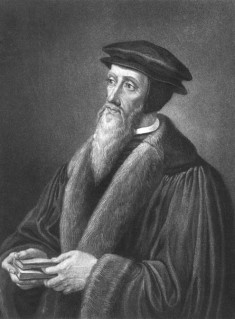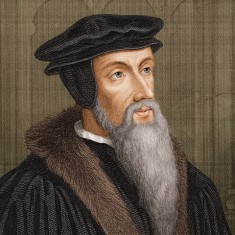| John Calvin | |
|---|---|
 |
|
| Theologian | |
| Specialty | Protestant Reformation |
| Born | July 10, 1509 Noyon, Picardy, France |
| Died | May 27, 1564 (at age 54) Geneva, Switzerland |
| Nationality | French |
Born in France in 1509, John Calvin succeeded Martin Luther as a preeminent Protestant theologian. He made a very powerful impact on fundamental doctrines of Protestantism, and he is considered to be a major figure in reformed Christianity. He possessed a great mind, spearheading a movement that transformed the church in America, Europe, and ultimately the entire world.
Calvin’s Early Life
John Calvin was born in France in 1509. His father served as an administrator in the town’s cathedral. His father wanted John to become a priest. Due to close ties with the bishop and his family, John’s friends and classmates in Noyon were noble and culturally influential in his childhood life.
At the age of 14, John Calvin went to the College de Marche in Paris. He studied logic, arithmetic, grammar, rhetoric, geometry, music and astronomy. In late 1523, he transferred to the College Montaigu. During this time, his schooling was paid for by income from the parish. Though the new theological teachings of the likes of Jacques Lefevre d’Etaples and Luther were spreading across Paris, John Calvin was tied to the Roman Catholic Church. As he made friends with people who supported reforms in the church, Calvin started to switch to reformed faith.
Calvin’s Religious Studies
Calvin’s father wanted him to study law. But when his father passed away in 1531, John had the freedom to continue his religious studies. He then moved to the city Orleans to study law. He was a law student at Orleans University when he joined the cause of Reformation.
The following years found him studying in different places and under different scholars. He finished his studies in 1533. During the years of his study, he experienced what he called a “sudden conversion.” He said that the Lord subdued his spirit to obedience by the conversion in his description of this experience.
Many historians see this period as being important as this was the time he was freed from his father’s chains. John Calvin was aware of the abuses in the Catholic Church in France, but he was not cynical. He felt that indeed he was God’s chosen in the spiritual renewal of the world. Calvin lived during a dangerous era. In 1533, he fled Paris. The following year, 24 heretics were burned.
Calvin in Europe
 For the next three years, John Calvin roamed around France, Switzerland, and Italy preaching and teaching. His religious doctrines placed a lot of emphasis on the sovereignty of scriptures as well as divine predestination—a teaching holding that God chooses few to enter His Kingdom, irrespective of their faith or their good works on earth.
For the next three years, John Calvin roamed around France, Switzerland, and Italy preaching and teaching. His religious doctrines placed a lot of emphasis on the sovereignty of scriptures as well as divine predestination—a teaching holding that God chooses few to enter His Kingdom, irrespective of their faith or their good works on earth.
In 1536, Calvin published the very first edition of the Institutes of Christian Religion in an attempt to homogenize the theory of Protestantism. The book was revised on several occasions and the last version was published in 1559. The last version was a clarification of his spiritual standpoint. It also explained how his church ought to be organized.
In 1536, Calvin went to Switzerland’s capital, Geneva, which became the core of his work. At first he wanted to settle in the city of Strasbourg, but a civil war prevented him from doing so. To spread his message easily, he established a number of schools in Geneva.
At that time, the city of Geneva became a safe haven for religious reformers who fled persecution in their countries. In 1559, he modified the Institutes of Christian Religion and translated it into many different languages for distribution across Europe. However, his health started to fail in 1564 and he died that year. He is buried in Geneva.
Accomplishments and Legacy
John Calvin’s greatest accomplishment was in enabling the division of the church from the government. Given the situation at the time, and how the papacy and kings sought to control each other, this division by Calvin was a remarkable idea. Also, he preached on a regular basis and wrote commentaries on the books in the Scripture. He also founded Geneva Academy, which became the very first Protestant college.